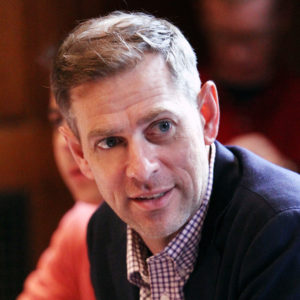
R.J. Snell is Editor-in-Chief of Public Discourse and Director of Academic Programs at the Witherspoon Institute. Previously, he was for many years Professor of Philosophy and Director of the Philosophy Program at Eastern University and the Templeton Honors College, where he founded and directed the Agora Institute for Civic Virtue and the Common Good.
He earned his M.A. in philosophy at Boston College, and his Ph.D. in philosophy at Marquette University. His research interests include the liberal arts, ethics, natural law theory, Thomas Aquinas, the Catholic intellectual tradition, and the work of Bernard Lonergan, SJ.
Snell is the author of Through a Glass Darkly: Bernard Lonergan and Richard Rorty on Knowing without a God’s-eye View (Marquette, 2006), Authentic Cosmopolitanism (with Steve Cone, Pickwick, 2013), The Perspective of Love: Natural Law in a New Mode (Pickwick, 2014), Acedia and Its Discontents (Angelico, 2015), and co-editor of Subjectivity: Ancient and Modern (Lexington, 2016) and Nature: Ancient and Modern (Lexington), as well as articles, chapters, and essays in a variety of scholarly and popular venues. He and his family reside in the Princeton area.
| Cookie | Duration | Description |
|---|---|---|
| cookielawinfo-checkbox-analytics | 11 months | This cookie is set by GDPR Cookie Consent plugin. The cookie is used to store the user consent for the cookies in the category "Analytics". |
| cookielawinfo-checkbox-functional | 11 months | The cookie is set by GDPR cookie consent to record the user consent for the cookies in the category "Functional". |
| cookielawinfo-checkbox-necessary | 11 months | This cookie is set by GDPR Cookie Consent plugin. The cookies is used to store the user consent for the cookies in the category "Necessary". |
| cookielawinfo-checkbox-others | 11 months | This cookie is set by GDPR Cookie Consent plugin. The cookie is used to store the user consent for the cookies in the category "Other. |
| cookielawinfo-checkbox-performance | 11 months | This cookie is set by GDPR Cookie Consent plugin. The cookie is used to store the user consent for the cookies in the category "Performance". |
| viewed_cookie_policy | 11 months | The cookie is set by the GDPR Cookie Consent plugin and is used to store whether or not user has consented to the use of cookies. It does not store any personal data. |